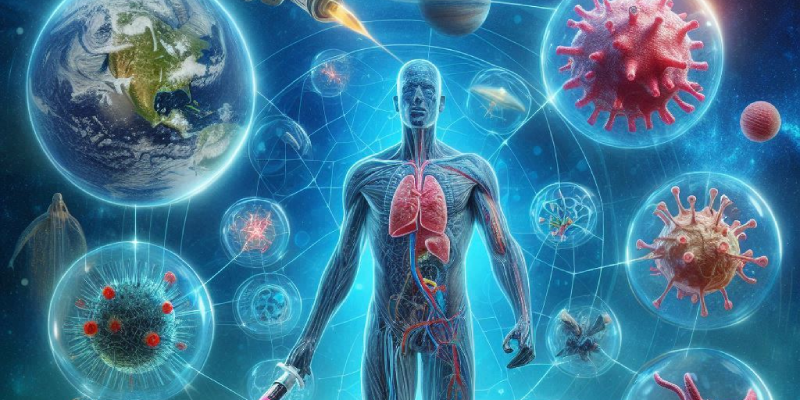Cancer, a leading cause of death worldwide, has long been treated through surgery, radiation, and chemotherapy. However, the advent of immunotherapy has revolutionized the landscape of cancer treatment. By leveraging the body’s immune system to recognize and attack cancer cells, immunotherapy presents a promising avenue that could potentially become a standard treatment for various types of cancer. This article examines the latest developments in immunotherapy and its future potential.
Understanding Immunotherapy
Immunotherapy works by stimulating or restoring the immune system’s ability to fight cancer. Unlike traditional treatments that directly target cancer cells, immunotherapy empowers the body’s natural defenses. This approach can lead to more precise targeting of cancer cells, sparing healthy tissues and reducing side effects.
Types of Immunotherapy
1. Checkpoint Inhibitors: These drugs block proteins that prevent the immune system from attacking cancer cells. By inhibiting these checkpoints, such as PD-1/PD-L1 and CTLA-4, the immune system can recognize and destroy cancer cells more effectively.
2. CAR-T Cell Therapy: This involves modifying a patient’s T cells to express chimeric antigen receptors (CARs) that specifically target cancer cells. Once infused back into the patient, these engineered T cells can seek out and eliminate cancer.
3. Cancer Vaccines: These vaccines aim to stimulate the immune system to attack cancer cells by presenting them with cancer-associated antigens. Preventive vaccines, like the HPV vaccine, protect against virus-induced cancers, while therapeutic vaccines target existing cancer.
4. Cytokines: These are proteins that modulate the immune response. Interleukins and interferons are examples of cytokines used to boost the immune system’s ability to fight cancer.
Latest Developments in Immunotherapy
Breakthroughs in Checkpoint Inhibitors
Checkpoint inhibitors have shown remarkable success in treating melanoma, non-small cell lung cancer, and renal cell carcinoma. Recent studies highlight their effectiveness in combination with other therapies, enhancing overall survival rates and reducing recurrence.
Advancements in CAR-T Cell Therapy
CAR-T cell therapy has demonstrated significant efficacy in blood cancers like leukemia and lymphoma. Ongoing research aims to expand its use to solid tumors, which present a more challenging environment due to their complex microenvironment. Innovations in CAR design and delivery methods are showing promise in overcoming these challenges.
Personalized Cancer Vaccines
Personalized vaccines, tailored to an individual’s unique cancer profile, are emerging as a cutting-edge approach. By analyzing the genetic makeup of a patient’s tumor, researchers can develop vaccines that target specific mutations, improving the immune system’s precision and effectiveness.
Enhanced Cytokine Therapies
Novel cytokine therapies are being developed to minimize side effects and improve efficacy. Researchers are engineering cytokines to selectively activate immune cells in the tumor microenvironment, reducing systemic toxicity. Potential of Immunotherapy as a Standard Treatment
Expanding Applications
As research progresses, immunotherapy is being explored for a broader range of cancers, including those previously considered unresponsive to immunological interventions. Trials are investigating the use of immunotherapy in breast, prostate, and pancreatic cancers, among others.
Combining Therapies
Combining immunotherapy with traditional treatments, such as chemotherapy and radiation, is proving to be a powerful strategy. These combinations can enhance the immune response, improve the effectiveness of existing treatments, and overcome resistance.
Biomarkers and Precision Medicine
The identification of biomarkers that predict response to immunotherapy is crucial for its success. By understanding which patients are most likely to benefit, clinicians can tailor treatments, optimizing outcomes and minimizing unnecessary exposure to side effects.
Overcoming Challenges
Despite its promise, immunotherapy faces challenges such as variability in patient response and immune-related adverse effects. Ongoing research is focused on understanding the mechanisms of resistance and developing strategies to mitigate side effects, ensuring broader and safer applicability.
The future of immunotherapy in cancer treatment is bright, with ongoing advancements bringing us closer to harnessing the full potential of the immune system. As research continues to unravel the complexities of cancer and immune interactions, immunotherapy is poised to become a cornerstone of cancer treatment, offering hope for improved survival and quality of life for patients worldwide. With its potential to provide long-lasting remissions and even cures, immunotherapy represents a significant leap forward in the fight against cancer.

